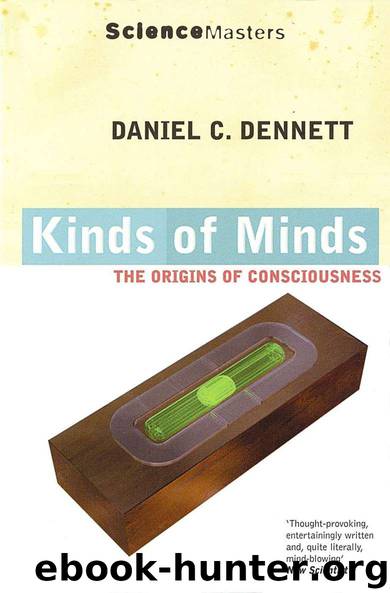Kinds Of Minds (SCIENCE MASTERS) by Dennett Daniel C

Author:Dennett, Daniel C. [Dennett, Daniel C.]
Language: eng
Format: epub
ISBN: 9781780227641
Publisher: Orion
Published: 2013-12-30T23:00:00+00:00
THE SEARCH FOR SENTIENCE: A PROGRESS REPORT
We have been gradually adding elements to our recipe for a mind. Do we have the ingredients for sentience yet? Certainly the normal behavior of many of the animals we have been describing passes our intuitive tests for sentience with flying colors. Watching a puppy or a baby tremble with fear at the edge of an apparent precipice, or a rat grimacing in apparent disgust at the odor of supposedly toxic food, we have difficulty even entertaining the hypothesis that we are not witnessing a sentient being. But we have also uncovered substantial grounds for caution: we have seen some ways in which surprisingly mindlike behavior can be produced by relatively simple, mechanical, apparently unmindlike control systems. The potency of our instinctual responses to sheer speed and lifelikeness of motion, for instance, should alert us to the genuine—not merely philosophical—possibility that we can be fooled into attributing more subtlety, more understanding, to an entity than the circumstances warrant. Recognizing that observable behavior can enchant us, we can appreciate the need to ask further questions—about what lies behind that behavior.
Consider pain. In 1986, the British government amended its laws protecting animals in experiments, adding the octopus to the privileged circle of animals that may not be operated upon without anesthesia. An octopus is a mollusk, physiologically more like an oyster than a trout (let alone a mammal), but the behavior of the octopus and the other cephalopods (squid, cuttlefish) is so strikingly intelligent and—apparently—sentient that the scientific authorities decided to let behavioral similarity override internal difference: cephalopods (but not other mollusks) are officially presumed to be capable of feeling pain—just in case they are. Rhesus monkeys, in contrast, are physiologically and evolutionarily very close to us, so we tend to assume that they are capable of suffering the way we do, but they exhibit astonishingly different behavior on occasion. The primatologist Marc Hauser has told me in conversation that during mating season the male monkeys fight ferociously, and it is not uncommon to see one male pin another down and then bite and rip out one of its testicles. The injured male does not shriek or make a facial expression but simply licks the wound and walks away. A day or two later, the wounded animal may be observed mating! It is hard to believe that this animal was experiencing anything like the agonies of a human being similarly afflicted—the mind reels to think of it—in spite of our biological kinship. So we can no longer hope that the physiological and behaviorial evidence will happily converge to give us unequivocal answers, since we already know cases in which these two sorts of compelling if inconclusive evidence pull in opposite directions. How then can we think about this issue?
A key function of pain is negative reinforcement—the “punishment” that diminishes the likelihood of a repeat performance—and any Skinnerian creature can be trained by negative reinforcement of one sort or another. Is all such negative reinforcement pain? Experienced
Download
This site does not store any files on its server. We only index and link to content provided by other sites. Please contact the content providers to delete copyright contents if any and email us, we'll remove relevant links or contents immediately.
| Anthropology | Archaeology |
| Philosophy | Politics & Government |
| Social Sciences | Sociology |
| Women's Studies |
The remains of the day by Kazuo Ishiguro(8999)
Tools of Titans by Timothy Ferriss(8396)
Giovanni's Room by James Baldwin(7346)
The Black Swan by Nassim Nicholas Taleb(7129)
Inner Engineering: A Yogi's Guide to Joy by Sadhguru(6795)
The Way of Zen by Alan W. Watts(6614)
The Power of Now: A Guide to Spiritual Enlightenment by Eckhart Tolle(5781)
Asking the Right Questions: A Guide to Critical Thinking by M. Neil Browne & Stuart M. Keeley(5775)
The Six Wives Of Henry VIII (WOMEN IN HISTORY) by Fraser Antonia(5515)
Astrophysics for People in a Hurry by Neil DeGrasse Tyson(5190)
Housekeeping by Marilynne Robinson(4447)
12 Rules for Life by Jordan B. Peterson(4304)
Ikigai by Héctor García & Francesc Miralles(4274)
Double Down (Diary of a Wimpy Kid Book 11) by Jeff Kinney(4272)
The Ethical Slut by Janet W. Hardy(4253)
Skin in the Game by Nassim Nicholas Taleb(4248)
The Art of Happiness by The Dalai Lama(4130)
Skin in the Game: Hidden Asymmetries in Daily Life by Nassim Nicholas Taleb(4007)
Walking by Henry David Thoreau(3962)
